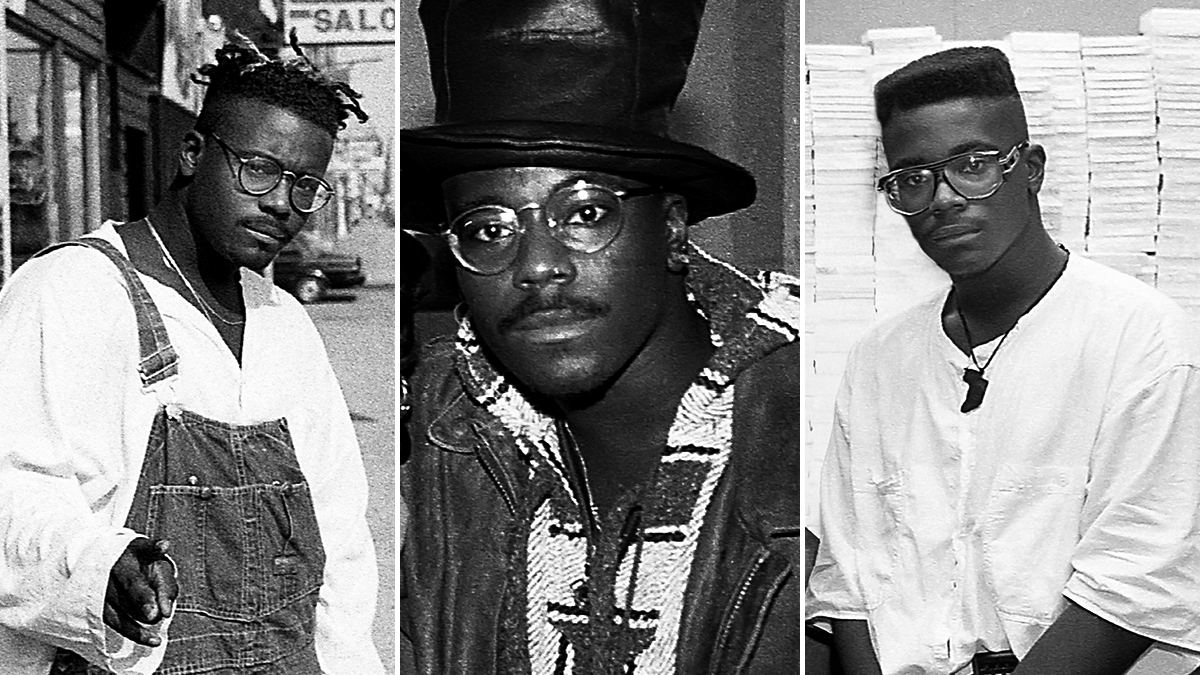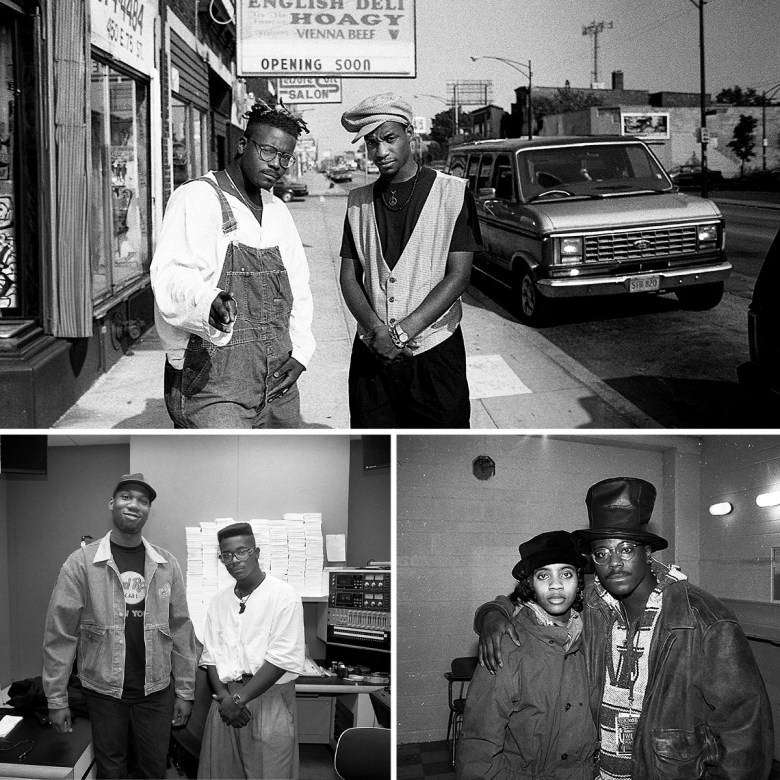 Tshoma Pugh, aka Taco Bops (in glasses), pictured in the late 80s and early 90s with Masta Ace (top), KRS-One (lower left), and MC Lyte. Credit: Raymond Boyd
Tshoma Pugh, aka Taco Bops (in glasses), pictured in the late 80s and early 90s with Masta Ace (top), KRS-One (lower left), and MC Lyte. Credit: Raymond Boyd
Chicago hip-hop lost a foundational figure last month: Tshoma Pugh, better known as Taco Bops, died at age 54 on Saturday, July 26. As a teenager in the 1980s, Pugh took up graffiti writing, dancing, beatboxing, DJing, and MCing. Toward the end of that decade, he achieved national exposure as hip-house surged in popularity—he toured with Fast Eddie and rapped in the Hip House Syndicate, a group put together by Farley “Jackmaster” Funk. In 1988, Pugh helped found WGCI radio’s first hip-hop program, The Rap Down. “I think that’s one of the lasting elements of his legacy, and one of the most unsung,” says longtime collaborator Ian Blake, who raps under the name Chicago Threez.
Blake and Pugh grew up on the same block in East Garfield Park, where they met as children. They found their separate ways into hip-hop in the late 70s and early 80s. Blake got into it via the first big hip-hop hits and through breaking—a bowling alley on Madison called Cascade hosted breaker battles on Saturday nights. Around 1983, Blake reconnected with Pugh. “He’s beatboxing now,” Blake says. “He’s not rhyming, but he knows cats that can rhyme. We come together like that. Now we walkin’ around, battling everyone in the neighborhood.” Blake named himself M.C. SnakeRoc, and Pugh became Taco-T. They called their group Cold Chillin’ Crew. (New York label Cold Chillin’ didn’t exist yet.)
The group evolved over the years (or became several different groups with various members, depending on how you look at it), but Pugh and Blake remained at the core of whatever was happening. Pugh picked up DJing at age 14, in 1985, and started going by Taco Bopskee, right around the time his crew changed their name to FIO. “FIO was ‘Figure It Out,’” Blake says. “We became a hip-hop crew and a graffiti crew.” Their tags drew in other graffiti writers such as Todd “Toddsonic” McCurry, who met Pugh and Blake walking down Walnut Street.
“On Lake Street, all you used to see was ‘Taco Bops’ spray-painted on the walls, and ‘SnakeRoc,’” McCurry says. “These guys had tags and piece books. I recognized them and called them out on their names.” McCurry would eventually join Unlimited Potential Posse, an umbrella crew that included FIO. “We were B-boys,” McCurry says. “We did graffiti, we hung out, but we had a little bit more than that—we really were friends.”
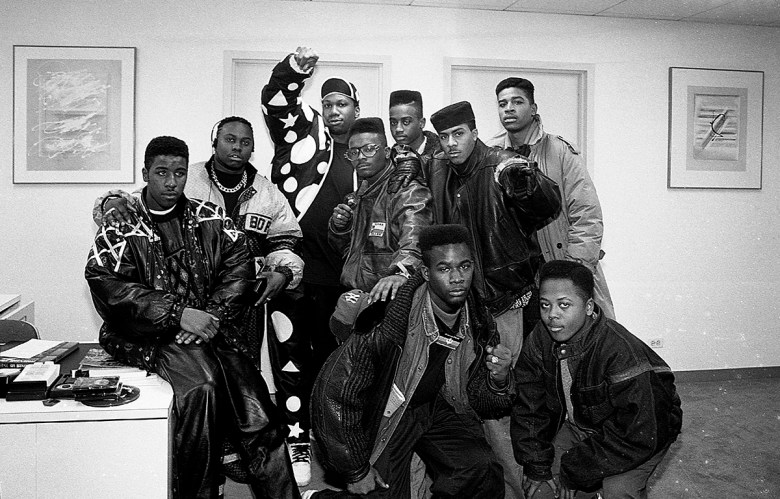 Taco Bops (center, in glasses) with the Boogie Down Productions crew in February 1989 Credit: Raymond Boyd
Taco Bops (center, in glasses) with the Boogie Down Productions crew in February 1989 Credit: Raymond Boyd
As Pugh got deeper into DJing, he joined a record pool, which greatly expanded his hip-hop knowledge. Howard Bailey, then a doorman at Medusa’s in Lakeview, describes Pugh as “a hip-hop soldier.” “I was getting heavy into house music because of working at Medusa’s. He always kept me abreast of hip-hop,” Bailey says. “He’d come to my house, like, ‘Check out this new Ed O.G.’ He always fed me music.”
Pugh’s drive to evangelize for the latest and greatest hip-hop extended to everybody in Chicago. He made a habit of calling Doug Banks’s WGCI show, encouraging the station to play rap. Eventually Banks’s producer, Ramon “Ramonski Luv” Wade, took a shine to Pugh. Wade hooked up Pugh with his WGCI gig, which began in 1988 under Wade’s tutelage. Because Wade often went by “Ramonski” (which rhymed with “Taco Bopskee”), Pugh shortened his stage name to Taco Bops. He also came up with a backronym: “The Admired Cool One, Beyond Ordinary Poetic Skills.”
Pugh pitched WGCI on an all–hip-hop show, and at the time, no commercial station in the city had one. When WGCI launched The Rap Down in 1988, Wade helped host—and he leaned heavily on Pugh to shape the programming. Pugh brought in his own records for the show to play on the air.
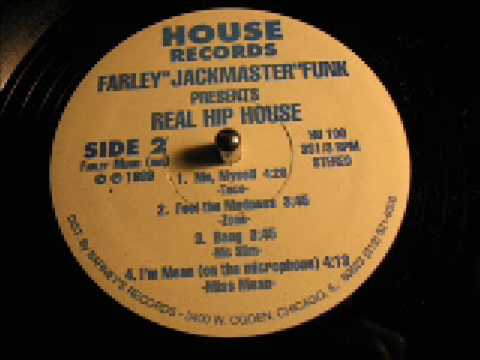
The Taco Bops track “Me, Myself” from the 1989 comp Real Hip House, presented by Farley “Jackmaster” Funk
WGCI also gave Pugh extraordinary access to new music. His close friend Derrick Sales, aka Dee Jay Sound, remembers giving Pugh a ride to prom in 1989. “He came up with the new Public Enemy joint, put it on tape, and we was listening to it all the way from downtown,” Sales says. “We just kept blasting it—that song hadn’t even came out on the radio yet, yet here we are listening to it. He had a lot of connections.”
Among those connections was Farley “Jackmaster” Funk, the house icon who recruited Pugh to rap in the Hip House Syndicate. In a 2020 interview, Pugh said that the video for their 1990 single, “Free James Brown,” had aired on MTV and BET. “Hip-hop and house—that was one of the things that Tshoma, he believed in,” McCurry says. “He was very involved in it.”
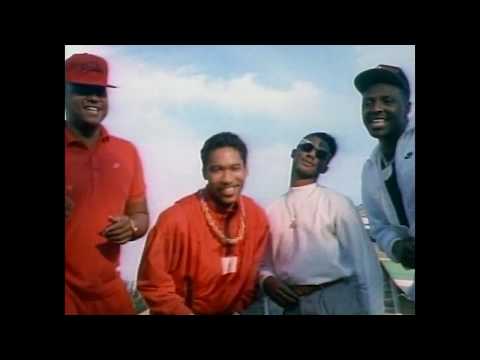
Taco Bops appears at 3:25 in the Hip House Syndicate’s video for “Free James Brown.”
Pugh frequently performed with hip-house architect Fast Eddie—first as a dancer, then as a DJ, then as a hype man. Fast Eddie brought Pugh on tour to Puerto Rico, where he met another hip-house star, Tyree Cooper. “We vibed from there,” Cooper says. “We tried to do demos at my house. He brought me into consciousness.” Cooper says Pugh also gave him pointers on developing his rap skills.
“He was hip-hop, he was house—he epitomized hip-house,” Cooper says of Pugh. When Cooper made a video for his 1988 breakout single, “Turn Up the Bass,” he invited Pugh to dance in it—and Pugh recruited the camera-shy Bailey. (“Only Taco could get me to do something like that,” Bailey says.)
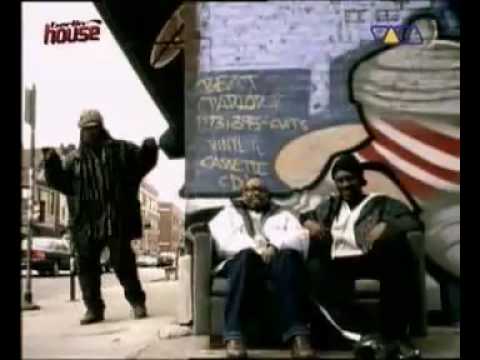
Taco Bops can briefly be seen dancing at 1:34 in Tyree Cooper’s video for “Turn Up the Bass.”
Pugh continued working on music in the ensuing decades, often with friends. He produced many of Blake’s recordings as Chicago Threez, sometimes acting as hype man or appearing in videos.
In November 2019, Pugh suffered a stroke. He was also fighting diabetes, and he eventually lost vision in one eye, became paralyzed on his right side, and had parts of both legs amputated. He spent his final years in a nursing facility, though he kept up with his hip-hop community.
“KRS-One was here last year, and [Taco] was like, ‘I gotta get down and see him,’” Bailey says. “He broke out of the rehabilitation center. . . . Well, he didn’t break out, but he was supposed to sign out, and he didn’t know about it. He was like, ‘I’m going. I’m going.’”
Last week, Pugh’s family launched a GoFundMe to cover the cost of his funeral.
Got a tip? Email your Chicago music news to gossipwolf@chicagoreader.com.
Reader Recommends: CONCERTS
Upcoming shows to have on your radar.
